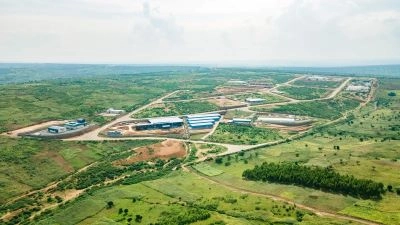Africa stands at the crossroads of opportunity and transformation, with wheat flour processing emerging as a game-changer. Urbanization and shifting dietary habits are driving demand for wheat-based products, creating a unique opportunity for investors.
- Growing demand for wheat-based products in Africa due to urbanization and changing dietary habits (Source: https://www.fao.org/home/en/).
- Despite rising demand, Africa still relies heavily on wheat imports, creating a gap for local processing plants to fill (Source: https://www.afdb.org/en).
- For Middle Eastern investors, Africa offers a strategic opportunity to expand and diversify their portfolios in a fast-growing market.
Africa’s Growing Wheat Product Demand: A Market Ready for Investment

With the continent’s cities growing at an unprecedented rate, urbanization is reshaping consumption patterns. The result? A significant increase in demand for wheat flour, creating a massive opportunity for local processing.
- Urbanization is driving an increase in wheat consumption across the continent.
- Cities like Lagos, Nairobi, Cairo, and Johannesburg are seeing growing populations and a shift to processed foods, boosting flour consumption.
- Local wheat flour production has significant potential to reduce reliance on imports.
- Filling this gap can drive profitability and contribute to economic independence in African countries.
- Middle Eastern investors can benefit from this growing market by investing in Africa, particularly in local processing facilities to meet demand and capture market share early.
Strategic Locations for Wheat Flour Mills: The Best Places to Invest

Choosing the right location can make or break an investment. Africa’s key regions not only boast rising demand but also offer logistical advantages for Middle Eastern investors looking to trade and grow.
- Key markets for wheat flour processing include Egypt, Nigeria, Kenya, and South Africa.
- These countries have rising demand and are already major importers of wheat, presenting an opportunity for local production.
- Proximity to the Middle East offers logistical advantages for trade, including access to key shipping routes and reduced transportation costs for Middle Eastern investors.
- Infrastructure improvements and access to local wheat supplies in these regions make them ideal locations for funding for business in Africa and investment in processing mills.
Why Invest Now? The Competitive Advantage For Middle East Investors
Timing is everything. Investing in Africa’s wheat flour industry today offers first-mover advantages that can position investors as market leaders for years to come.
- Market growth: The wheat flour industry in Africa is projected to grow by 40% over the next decade.
- The rise of the middle class and demand for convenience foods are driving this growth.
- Early entry into the market provides a competitive edge for investors looking to capitalize on long-term growth.
- The potential to expand into other African markets and beyond creates diversified revenue streams.
- Returns are poised to be strong due to rising demand and a lack of sufficient local production in many African countries.
Unlocking Regional Growth: Export Potential Beyond Africa
Africa’s location is a strategic asset. For investors looking to extend their reach, the continent offers a unique platform to export wheat flour globally while leveraging established trade routes.
- Strategic location: Africa’s location makes it an ideal export hub for wheat flour to Europe, Asia, and the Middle East.
- Export opportunities: With established trade routes, Middle Eastern investors can tap into global markets, creating new opportunities.
- Supply chain growth: By developing a strong local supply chain, investors can reduce costs and expand market reach to both local and international customers.
Wheat-Based Products and Their Relevance to the Middle East

Wheat flour serves as the foundation for a wide variety of products that meet the needs of diverse consumer markets, especially in the Middle East where wheat-based foods are dietary staples. Key products include:
- Flatbreads and Pita: Essential in Middle Eastern cuisine, widely consumed across households and foodservice industries.
- Pasta and Noodles: Growing demand for quick, convenient meal options.
- Pastries and Desserts: Popular during festivals and celebrations, adding cultural relevance and market demand.
- Biscuits and Cakes: Increasingly popular with young consumers and suitable for retail expansion.
- Breakfast Cereals: Meeting the rising demand for healthier, quick breakfast alternatives.
- Wheat Bran and Animal Feed: By-products like wheat bran are essential for livestock feed, supporting the Middle East's agriculture sector.
By diversifying the range of wheat-based products, investors can cater to different market segments, strengthen trade ties, and enhance profitability.
Ready to Take the Next Step?
The African wheat flour processing market is ripe for investment, and the time to act is now. Let’s work together to help you capture this opportunity and create a profitable, sustainable business.










